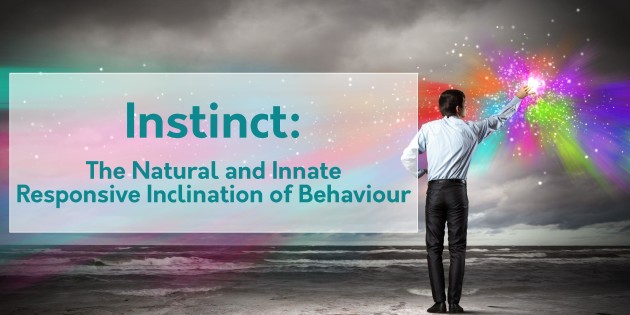Our instincts are our driving force. We live by instinct on both a conscious and subconscious level. The way we behave is primarily based on our instincts. Our brain doesn’t need to think to breath, we do this instinctively. The way we behave, move, eat, sleep, drink, interact, have sex and learn is primarily based on our instincts. In fact, our instincts drive us to do the things we do on a regular basis. Instincts are our survival mechanism and they for the most part, keep us alive.
We are all aware to some degree that we have instinct. Most people I speak with are aware of their instincts to some degree. But, it’s also surprising to discover that apart from the basics of eating, drinking and sleeping, the vast majority of people are unaware of the degree to which they use their instincts on a daily basis. We can observe others using their instincts in their environment constantly and we seem to notice it more externally than we do internally.
For the most part of our lives, we are acting purely on our instincts. We recognise this in animals as we watch the pride of lions hunting their prey. We make comments on how they are working strategically to survive. Yet these lions are merely behaving and thinking in a way that is natural and not learned. They are born with a natural ability to hunt and survive. They don’t think about it or discuss it with their friends. They know what they have to do, they were born to do it and they just get on with it.
Do instincts vary from person to person? Of course they do. We all have our own unique and natural abilities that are purely for us to use and enjoy. Some of us have a natural instinct to cook, others to write, some to practice medicine or heal and others to create works of art. All of these natural abilities are fuelled purely by instinct. Our instincts will compel certain behaviours when we are in different situations. For example, seeing a baby can arouse the maternal instinct of a woman who has the desire to have a child and she will react and behave in a certain way that is responsive when she sees a baby or baby items.
Our instincts keep us alive. They steer us away from danger or they push us towards pleasure. When we are frightened or scared, our instincts will compel us to run or stand and fight. They are also involved when we are interacting with others. They give us an indication if we are in good company or bad. They drive us in our careers with an innate knowledge and ability to perform certain jobs or career paths. For instance, a doctor will combine all of his or her knowledge, skills and abilities to diagnose medical situation, but will always act on instinct when it comes to the action they will take in an emergency.
In summary, we learn a lot from other people in our environments and we will inherit some of these behaviours. As an animal, only 50% of whom we are is DNA and the rest is socially cultivated. But when there is no social cultivation taking place, we will always act on our instincts. Our behaviour stems from our instincts to survive and seek pleasure or steer away from danger. It’s true that some behaviours are a mixture of both instinct and social cultivation, such as the languages we speak and the foods we eat. However, our primal instincts happen without any prompting at all, like running, walking, picking things up, eating, drinking, reproducing and sleeping. In short, when we talk about our instincts, we are referring to our natural responses in any situation.





